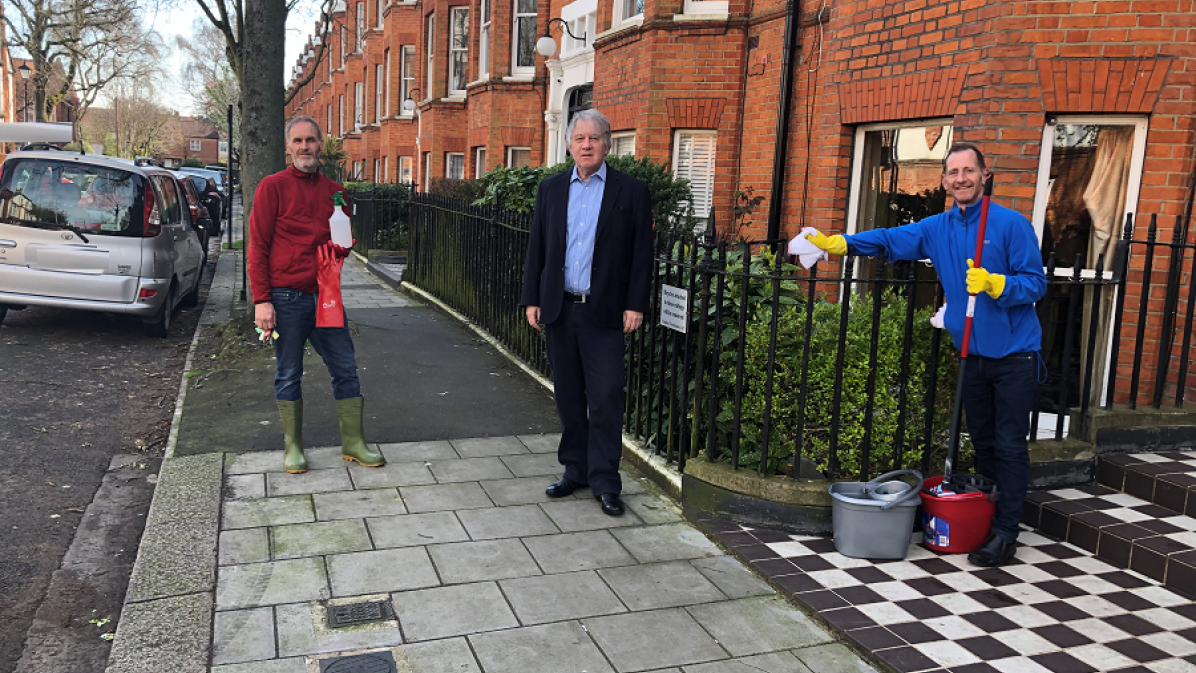Covid-19: We are all community activists
Thinking the Unthinkable is regularly posting personal stories and leadership insights on the Coronavirus pandemic so that everyone can benefit from the experiences of others. Please share your stories either by adding your comment below or email us at contact@thinkunthink.org
In this latest COVID-19 blog, two senior professionals, Lucian J Hudson and his colleague, Peter Hudson, share their experiences on leading the building of solidarity among their neighbours. How much do they and their communities change? They ask: is it the same spirit as during World War Two?

I live in a West London street that is mostly residential, in one of 66 flats made up of 11 blocks. Many neighbours who were strangers are strangers no more.
I chair the residents’ association. Four weeks ago, well before the UK Lockdown, I set up a network of volunteer marshals. Each is responsible for their block. One marshal takes the lead for establishing the status of each flat. He or she wants to know if anybody is at risk, self-isolating or a confirmed case. We check that every one of us, particularly the elderly and most vulnerable, has support if we need it.
We have two simple rules: share basic information and ensure that nobody feels emotionally isolated or practically unsupported. Some marshals go the extra mile. They ensure all blocks are kept clean every day. Volunteers wipe with disinfectant every rail, doorway, bannister and entry buzzer. Of course they keep a minimum two metres distance from each other.
This initiative shows every resident that we neighbours will play our parts to stop the virus from spreading.
We are not afraid to ask for help. We are developing new habits as we work out what we do next. We are anticipating more than we have ever had to do.
Anticipating is the way forward
I am just one of a huge number committed to doing the same across the UK and the world.
Let me introduce Peter Hudson (no family relation). We are both professional campaigners and communicators. But the past month has hit us deeply and personally. Peter lives in another London suburb. We now realise that for too long we have taken our communities for granted. This crisis is sparking the hope in us that our communities will grow stronger. Now we can see they are critical to help us all to pull through.
Peter devoted his spare time in January and February to setting up anti-crime WhatsApp groups in every road, each reporting up to the area coordinator. This meant he and others could disseminate and share important information super fast and efficiently.
At the same time, he was receiving increasingly agitated messages from a close friend teaching in China. Peter registered a modest alarm at his account of from Wuhan. It seemed alien and certainly not something to be overly concerned about.
When Coronavirus came to Iran and Italy, Peter found himself struggling to sleep. Disparate, anxious thoughts hit him, from fear of his two young children losing their parents to how his frail, elderly parents would fare. Peter then recalled dark moments from history. He wondered how people felt in 1918 as the Spanish Flu pandemic cruelly preyed on the young. He imagined the range of emotions that must have crossed the minds of villagers in the Derbyshire village of Eyam: it cut itself from the world in order to stem the spread of the plague.
Then Covid-19 came to the UK. A week before the lockdown began on 23 March, Peter liaised with the many people he met while establishing the WhatsApp crime groups. They decided unanimously to become a community force for coordinating support and care. His emotions snapped at seeing an elderly woman close to tears in a local supermarket. She was desperate as she could not get much food.
Here is Peter’s action plan. Many can learn from it.
- Look after immediate neighbours. Be available at any time for a chat or urgent call.
- Establish safe practice and ways to support the vulnerable and elderly.
- Share intelligence to reduce the chance of criminals taking advantage of the situation.
- Try to balance all this while raising small children, doing his job, and sorting out support for his parents.
Sea-change in ourselves and our communities
Peter and I have felt and witnessed a sea change in ourselves and our communities. It cannot be that far removed from the sense of solidarity people felt in during World War Two.
At times we are stressed. We are afraid and certainly feel a degree of helplessness. To unite a community is tremendously empowering and good for the heart and soul. We get the sense we all feel very grateful for a greeting across the street. We appreciate the simple pleasures in life more. We feel fairly secure, knowing that we are not alone and that if we should get the virus, someone will bring food and any medicine we need.
The virus has a head start on us. But as it spreads, so does community action. Humanity can communicate, connect and - at its best - care. We can beat - must beat - this virus. It matters what each of us does.
When will this end? Will there even be an end? None of us know where this will lead. Part of us fears this is simply a dress rehearsal for the increasingly ominous impact of climate change. The scale of that threat has not diminished because of COVID-19. But it is life-affirming to throw oneself into community action, and to harness energy and goodwill. God knows: we need that at the moment.
Being inclusive at times like this is not a soft option. It is the only option.
